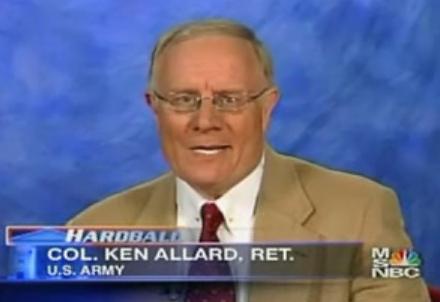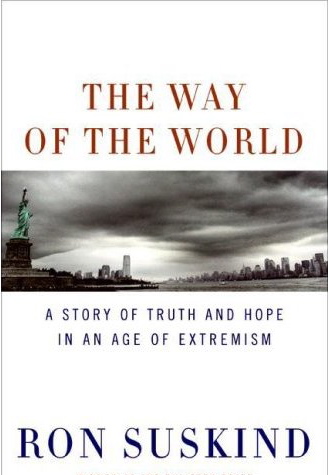The Pentagon's Pundits
 In early 2002, the Pentagon began cultivating retired military officers who frequently serve as media commentators, so that they would help make the case for invading Iraq.
In early 2002, the Pentagon began cultivating retired military officers who frequently serve as media commentators, so that they would help make the case for invading Iraq.

 In early 2002, the Pentagon began cultivating retired military officers who frequently serve as media commentators, so that they would help make the case for invading Iraq.
In early 2002, the Pentagon began cultivating retired military officers who frequently serve as media commentators, so that they would help make the case for invading Iraq.
Submitted by Diane Farsetta on
"Wal-Mart has been taking many major steps [to] go green in recent years," writes Eoin O'Carroll.
Submitted by Diane Farsetta on
 Remember the New York Times expose on the Pentagon's use of retired military officers who frequently appear as "military analysts" on television and radio news shows? The program was launched in 2002 to help sell the Iraq war, but soon expanded to other controversial issues.
Remember the New York Times expose on the Pentagon's use of retired military officers who frequently appear as "military analysts" on television and radio news shows? The program was launched in 2002 to help sell the Iraq war, but soon expanded to other controversial issues.
As reporters and researchers know all too well, releasing information isn't necessarily the same thing as releasing useful information.
 Case in point: the Pentagon's military analyst program. In early 2002, the Defense Department began cultivating "key influentials" -- retired military officers who are frequent media commentators -- to help the Bush administration make the case for invading Iraq. The program expanded over the years, briefing more participants on a wider range of Bush administration talking points, occasionally taking them overseas on the government's dime.
Case in point: the Pentagon's military analyst program. In early 2002, the Defense Department began cultivating "key influentials" -- retired military officers who are frequent media commentators -- to help the Bush administration make the case for invading Iraq. The program expanded over the years, briefing more participants on a wider range of Bush administration talking points, occasionally taking them overseas on the government's dime.
In April 2006, the group was used to counter criticism of then-Defense Secretary Donald Rumsfeld. The apparent coordination between the Pentagon and the pundits piqued the interest of New York Times reporters. Two years later -- after wresting some 8,000 pages of internal documents from the Defense Department -- the Times exposed the Pentagon's covert attempts to shape public opinion through its so-called "message force multipliers." A few weeks later, the Defense Department posted the same documents publicly.
It wasn't the high-octane data dump it first appeared to be. Sure, paging through the emails, slides and briefing papers is interesting, and occasionally you come across something noteworthy. But the documents are formatted in such a way that systematically exploring them via keyword searches is impossible. A cynic (or realist) might think the Pentagon was doing damage control by putting the documents out in the open, while making it near-impossible to find crucial needles in a very large, chaotically-compiled haystack.
Submitted by Judith Siers-Poisson on
 William Saletan wrote a tongue-in-cheek letter to U.S.
William Saletan wrote a tongue-in-cheek letter to U.S.
Submitted by Diane Farsetta on
 Wondering what the Lincoln Group, the public relations firm that planted U.S. military-written propaganda in Iraqi newspapers, is up to now?
Wondering what the Lincoln Group, the public relations firm that planted U.S. military-written propaganda in Iraqi newspapers, is up to now?
Submitted by Diane Farsetta on
Following a raid on a meatpacking plant in Postville, Iowa that's been condemned as "inhumane" and "a Kafkaesque travesty of justice," U.S.
Submitted by Anne Landman on
 In a new book, Pulitzer-prize winning reporter Ron Suskind charges that in the autumn of 2003, the White House ordered the Central Intelligence Agency (CIA) to forge and back-date a handwritten letter fro
In a new book, Pulitzer-prize winning reporter Ron Suskind charges that in the autumn of 2003, the White House ordered the Central Intelligence Agency (CIA) to forge and back-date a handwritten letter fro
Submitted by Diane Farsetta on
The U.S. Navy's Chief of Information (CHINFO) is taking on water. "Navy leaders have placed increased demands on CHINFO," which have "long outstripped CHINFO's capacity to respond," admits the Navy's solicitation for public relations help.
Submitted by Diane Farsetta on
It's an "open secret of lobbying," writes Jeffrey Birnbaum. "Public relations firms regularly solicit authors of opinion-page articles, draft the pieces for them and place the articles in publications where they will have the most impact -- all for a fee." Recently, an op-ed criticizing a bill that would reduce credit card fees appeared in Southern newspapers, attributed to Charles Steele Jr., the president of the Southern Christian Leadership Conference (SCLC).
Center for Media and Democracy (CMD)
520 University Ave, Ste 305 • Madison, WI 53703 • (608) 260-9713
CMD is a 501(c)(3) tax-exempt non-profit.
© 1993-2024